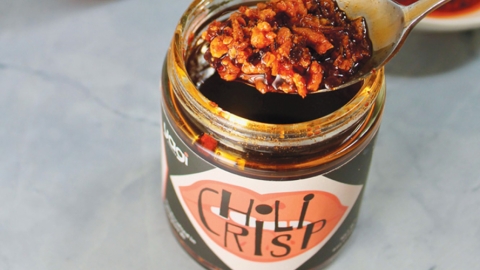Moromi Soy Sauce
When you conjure up the image of an expert maker of craft shōyu—authentic artisanal Japanese-style soy sauce—it’s likely not a retired guy from Connecticut named Bob, but here we are.
Bob Florence spent the better part of his career as a chemist and in business development and marketing in the automotive industry, spending much of his time in Japan, traipsing across Tokyo, Nagoya and beyond, acquiring a deep knowledge of Japanese cuisine and soy sauces along the way.
“At that time [in the late 1980s], there were over 2,400 soy sauce makers in Japan,” says Florence. Back at home, there were hardly any choices on American supermarket shelves. But that’s to be expected, he explains, as many Americans, perhaps most, primarily use soy sauce as a condiment with sushi. Florence’s experience abroad showed him the broad capabilities of shōyu, which in Japan is used in seasonings, salad dressings, as a flavor base for soups and sauces like teriyaki, and dipping sauces for other foods including gyoza dumplings and sashimi.
Eight years ago, Florence began experimenting with making shōyu, just as a hobby, as chemists, he says, are natural curiosity seekers.
“I thought that it would be interesting to play around and try and create that type of flavor which was, in my view, deeper, richer, full of umami and just incredibly well balanced and had usefulness outside of traditional soy sauces,” he says.
He built a fermenter to grow koji, the mold that is the starter for making soy sauce, essentially following the same methodology the Japanese have been practicing for centuries. At the time, he had zero business ambitions, just a desire to create an exceptional shōyu.
“I had buckets and buckets of experimental soy sauces,” he laughs. “I had soy sauce brewing in my dining room and my kitchen, up in my daughter’s bedroom I took over after she went to college, and down in the basement. I had barrels of soy sauce all over the house.”
Trial and error yielded a prized product that Florence was excited to share with another well-traveled palate. He and his wife, author Debbi Michiko Florence, were regulars at the Oyster Club in Mystic, Connecticut, where James Wayman was then executive chef. (Today, Wayman is a partner of Nana’s Bakery and Pizza in Mystic and Westerly and the newly opened River Bar in Westerly.)
“He brought me some miso and soy sauce and I thought it was super delicious,” says Wayman. “My first impression of Bob was that he was making almost an expression of him, which I found pretty amazing.” Wayman, serendipitously, had been growing his own koji at the restaurant the year leading up to when Florence approached him, and was already well versed in fermentation techniques.
The impressed chef began incorporating Florence’s shōyu with dishes. “There was a ‘Look, Mom!’ moment—my soy sauce at one of the best restaurants in Connecticut,” says Florence. “‘There’s Bob Florence’s soy sauce on a dish at the Oyster Club.’ That was a turning point and inflection point in my hobby,” says Florence.
Wayman became more than a client. He became a founding partner of Moromi Shōyu (now Moromi Soy Sauce) with Florence, and creative director. Today, the North Stonington–based small-batch fermentation company specializes in the production of koji, artisanal shōyu and miso using traditional methods.
To continue honing his craft, Florence wrote to the CEOs of 15 small soy sauce makers in Japan in the hopes of finding a mentor. “My pitch was just simply, ‘Hi, I’m Bob. I’m American. Can I come talk to you about making soy sauce?’” The effort led to a relationship with Kyosuke Iida, the president of Chiba Shoyu, based just outside of Tokyo. His family has been making soy sauce for five generations, and he’s become a guiding voice to Florence, offering product analysis and advice on different technical aspects of brewing that elevated the product.
Wayman and Florence also began to incorporate local ingredients in their products, including sugar kelp from Stonington Kelp Co. for Sugar Kelp Soy Sauce, and mushrooms from Seacoast Mushroom to make Maitake Soy Sauce. They also grow their own Korean Gochu peppers to make Gochu Chili Moromi Sauce and cayenne peppers to make Chili Moromi Sauce, which has a little kick to it.
“It’s a really tasty product that just has a lot of utility in different dishes. I particularly like it on Stonington scallops,” adds Florence.
“I think people have a very ‘straight line view’ of what soy sauce and miso are and what they’re used for,” says Wayman. Americans associate them purely with raw fish, stir-fry, teriyaki dishes and Chinese or Japanese food, he explains, adding that he and Florence are on a mission to expand that thinking.
“I think there’s a real need to show people that it can be used in food that they make every day. In Japan, particularly where Bob’s influence is coming from, soy sauce is used for cooking, but it’s also just a condiment that sits on the table, so [we’re] getting people to understand that they can just splash a little bit on their dinner and make their dinner exceedingly better.”
Andrea E. McHugh is a freelance writer who has written for the Hartford Courant, Baltimore Magazine, Daily Candy, Design Sponge, Providence Monthly and more. She resides in Newport.
Moromi products are available nationwide at more than 200 retailers including in Rhode Island at Stock Culinary Goods in Providence and Andrade’s Catch in Bristol.
For more, visit MoromiShoyu.com.









